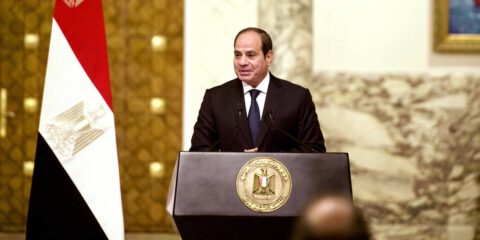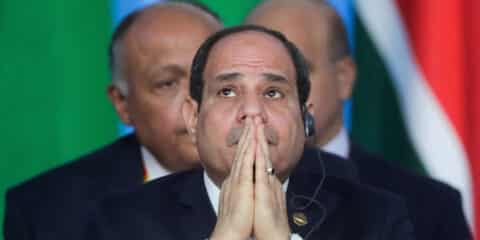Israel should act to ensure that the Greek-Egyptian EEZ delimitation map is globally endorsed, as opposed to the Turkish-GNA alternative, and work in the American arena to curb Erdogan’s ambitions.
The August 6, 2020 agreement between Egypt and Greece on the delimitation of the border between their respective Exclusive Economic Zones (EEZ) is an important diplomatic milestone in the ongoing struggle for the future of the eastern Mediterranean basin.
This agreement has been met by an aggressive Turkish response. In line with previous threats and actions, Turkey head-on challenged the Cairo agreement through the dispatch of a seismic survey ship, backed by naval forces, to areas which Turkey claims to be in its EEZ but the Greeks and Cypriot delineate as being in theirs. Turkey also disputes Greek territorial waters near the island of Castellorizo (Meis, in Turkish).
Recep Tayyip Erdogan’s provocations across the region now include airstrikes in Iraq (which recently took the lives of senior Iraqi officers); a large presence in Syria; meddling in the Arabian peninsula and the Horn of Africa; military intervention in Libya; as well as the diplomatic confrontation over the law of the sea and Ankara’s “doctrine” that islands do not create a claim to an EEZ. (The map drawn by Erdogan and GNA regime in Tripoli in November 2019 simply ignores the maritime rights that flow from the location of Crete.)
France has fully endorsed the Greek and Egyptian position in Libya and in the maritime dispute. Israel too should lend all possible diplomatic support to the Greek-Egyptian map, based upon the MFA statement of August 12, 2020. This is very much in line with the common interests of all members of the Eastern Mediterranean Gas Forum (EMGF), created in January 2019. Friends of Israel and of Greece, particularly in the US, should be mobilized in support of this position.
Implications of the Cairo Agreement
The Greek Foreign Minister, Nikos Dendias, and his Egyptian counterpart, Sameh Shukri, signed an agreement demarcating the border between the two countries’ Exclusive Economic Zones (Cairo, August 6, 2020). In June, Greece signed a similar agreement with Italy regarding the border in the Ionian Sea. Emphasizing that this “exemplary agreement” is in line with internal law and the Law of the Sea, Dendias then bluntly declared that the “illegal, null and void memorandum of understanding between Turkey and Libya” [signed in Ankara in November 2019 between President Erdogan and Prime Minister Faiz Sarraj of the “Government of National Accord” in Tripoli] has now “ended up where it belonged from the very first moment: in the rubbish bin”.[1]
Dendias went on to explain that the agreement with Egypt, like the one with Italy, reflects the rights – under the Law of the Sea – of nations with many islands (such as Greece) to claim the continental shelf and the EEZ of these islands. This came as a direct response to the Turkish doctrinal position that denies such rights. Ankara has translated this doctrine into action. Turkey claimed the waters between Rhodes and the small Greek island of Kastellorizo near the Turkish coast, based on its interpretation of the continental shelf. Turkey threatened to conduct a naval live-fire exercise in areas which Greece considers to be in its jurisdiction. Turkey also has indicated an intent to carry out energy exploration near Crete, in waters that the Cairo agreement designates as Greek.
The Prime Minister of Greece, Kyriakos Mitsotakis, added that the agreement generates a new reality in the eastern Mediterranean by restoring international legitimacy in the region, which the Turkish-Libyan MoU had tried to undermine. The signing can thus be described as a major strategic step, in the context of the bitter struggle pitched in recent years over the future of the eastern Mediterranean; and in particular since November 2019 and the Turkish intervention in Libya.
Roots of the Dispute and the Forces at Play
Under Erdogan’s leadership, Turkey actively has been seeking to establish regional and ideological hegemony. Following Retired Admiral Cem Gurdeniz’ concept of the “Blue Homeland” (Mavi Vatan) claiming large parts of the Mediterranean, Turkey has been building up its naval forces. It now seeks to build an aircraft carrier and other assets necessary for power projection well beyond Turkish waters.
In regional terms, Erdogan’s government is allied with the GNA in Tripoli. It acts as the patron of Hamas in Gaza and of other Muslim Brotherhood affiliates, and it relies upon the financial and political support of Qatar. It has meddled in the affairs of several other Arab and African countries. Meanwhile, some European players, such the present government of Malta and to some extent Spain and even Italy harbor sympathies towards the GNA, translating into tolerance for Turkish ambitions.
Greece and Egypt (and by necessity, Cyprus – with the northern part of the island under Turkish occupation since 1974) have positioned themselves in opposition to Erdogan’s plans. The Egyptians actively support Khalifa Haftar’s forces (the “Libyan National Army”, LNA) in eastern Libya, and his bid to defeat the GNA.
In this they are joined by the United Arab Emirates, whose leaders support President Abdel Fattah el-Sisi of Egypt and view both Qatar and the Muslim Brotherhood as sworn enemies. (Sarraj’s GNA is under the influence of Islamist elements.) The UAE foreign minister, Anwar Girgash, saluted the Cairo EEZ agreement as a “victory” of strategic proportions. Indeed, the signing is part of a broader plan to intervene militarily in Libya if the GNA forces advance beyond the Sirte-Jufra line.
Both Egypt and Greece are thus committed to contain Erdogan, foil his local gains in Libya and elsewhere, and undo his “neo-Ottoman” vision. In this venture, they are joined both by Russia (which has allowed or even sent the “Wagner” mercenaries to fight the LNA) and by France (which under Macron has been taking a consistent and overt pro-Greek and anti-Erdogan policy) – even if this threatens to tear NATO apart.
Erdogan’s Reaction and the Frontiers of Conflict
Ankara’s response to the Egyptian-Greek agreement was swift and sharp. “A maritime boundary between Greece and Egypt does not exist. This understanding will [be] reflect[ed] on the ground and at the table,” the Turkish foreign ministry said. It added that “Turkey will not allow any activity in the area in question.” Erdogan was equally aggressive. Within days he sent the seismic research vessel Oruc Reis, operated by the Turkish General Directorate of Mineral Research and Exploration, escorted by a Navy task force, to the disputed areas east of Crete.[2]
Meanwhile, the entire Turkish Navy was put on alert, and there were reports that its planned naval exercise near Kastellorizo (another potential flash point between Turkey and Greece) may be held earlier than originally scheduled. Ankara also announced the suspension of its willingness to take part in talks with Greece about the EEZ demarcation and other open issues (– talks that Germany and Spain have worked hard to convene in recent weeks). Admiral Gurdeniz, now retired, raised the suspicion that the talks were simply a ruse by Greece to blind Turkey to the agreement being negotiated with Egypt.
Thus, the battle for the Mediterranean has escalated. It is now been fought simultaneously, with a variety of weapons, on multiple fronts.
- The fighting in Libya, which ought to be viewed for all purposes as a proxy war between Turkey and Egypt. Due to the Turkish military intervention in support of the GNA (since November 2019) it is liable to deteriorate into a direct confrontation between the two countries.
- The effort (by Greece and others) to get the EU to actively impose the UN arms embargo on Libya. (NATO is paralyzed because Turkey has a veto in that organization). A ban on maritime supplies of war materials is by definition aimed at Turkish help to the GNA, since Egypt can use its border to provide the LNA with munitions. Operation “IRINI” of the EU naval forces was supposed to do just that, but tensions within the EU hamper it. A unilateral French intervention met with an aggressive Turkish response which almost led to an exchange of fire, and which led to a typical Turkish demand for a French apology.
- The ongoing maritime dispute between Greece and Turkey, which easily may lead to the use of violence, and perhaps a broader war, either over the waters of Kastellorizo or over Turkish explorations in the disputed EEZ east of Crete. (Turkish vessels, like all ships, have the right of passage, but not the use of other nations’ EEZ). The German leader, Angela Merkel, took it upon herself to mediate at what seemed the last moment before a violent confrontation (when a Turkish ship was about to sail and the Greek armed forces were put on alert). With the help of Spain, she seemed to gain consent from both Athens and Ankara (before the signing in Cairo) to negotiate and to avoid a clash between two members of NATO. But as mentioned above, this consent unraveled after the agreement in Cairo. Turkey still talks about raising the matter “at the table,” but suspended its willingness to negotiate at least until it makes a show of force.
- The ongoing Turkish pressure on Cyprus, demanding that no use can be made of the Cypriot EEZ until the “Turkish republic of Northern Cyprus” (TRNC) – which only Turkey recognizes as a sovereign nation – gets its fair share of the continental shelf and of assets in the eastern Mediterranean.
- The provocative and confrontational imagery and language which attended the transformation of the Haghia Sophia in Istanbul (originally a cathedral) from a museum to a mosque. This was an act of rejecting the Kemalist legacy, and it was given a distinct anti-Israeli flavor by high-level Turkish statements suggesting that “al-Aqsa mosque in Jerusalem was next” to be “liberated.”
- The continued support given by Turkey to the propaganda efforts of the Muslim Brotherhood, by direct broadcasts from Turkey as well as moral and material aid to Hamas in Gaza.
- Growing Turkish meddling in Lebanon, which becomes part of the broader eastern Mediterranean equation. In a direct and blatant response to the recent visit to Lebanon by French President Emmanuel Macron (who is perceived in Ankara, with good reason, as a rival in the regional game), a senior Turkish delegation showed up in Beirut a day later. Turkish Foreign Minister Mevlut Cavusoglu made an unconditional commitment to rebuild Beirut port, in what seems like a direct reaction to French offers which came with a demand for far-reaching political and administrative reforms in Lebanon.
- Added to all this, as of August 13, is the legal and diplomatic wrangle over the international legitimacy of the contending maps – the Greek-Egyptian version vs. the Turkish-Libyan one. The position taken by the US will be highly significant. As for the EU, in 2019 it published a sharp rebuke of the Erdogan-Sarraj MoU, but the rifts in the European position are growing wider as Malta and to some extent Italy assume a pro-GNA position.
What Can Israel Do?
The Government of Israel issued a statement of support for the Greek-Egyptian agreement on August 12. Israel is not a neutral player in this struggle. The IDF cannot lend a hand in battle, given the other challenges Israel faces at any moment. But in recent years security and intelligence cooperation between Israel and Greece (as well as Cyprus) has developed, alongside a broad commonality of interests with Egypt. Setting aside the rumors about direct Israeli assistance to Haftar’s LNA, it is clearly not in Israel’s interest for all of Libya to be ruled by a pro-Erdogan regime which is Islamist in its proclivities, owing its power to the Turkish intervention. The very positioning of such a regime on Egypt’s long border with Libya may cast a shadow over Egypt’s stability.
Moreover, the EEZ delimitation has a direct bearing on Israel’s strategic position and its economic interests. The putative Turkish-Libyan “border,” which ignores the rights that flow from the existence of Crete, means that any attempt to build a permanent energy or communications infrastructure connecting Israel, Egypt and Cyprus to Greece and to the rest of Europe (such as a gas pipeline or a power cable), would be subject to Ankara’s jurisdiction. This effectively would collapse the EMGF. (The Turks, for good reason, see the latter as a strategic institution aimed at isolating, “containing” and neutralizing their regional role.) For Israel, which seeks not only markets for her exports but also a way to bolster peace and strategic partnership with Egypt and Jordan, this could be a heavy blow.
Thus, it would be appropriate for Israel to build upon the statement of August 12 and pursue an intensive effort to promote the Greek-Egyptian map over its Turkish-Libyan rival. Israel can lobby the administration and Congress in Washington. Within the Trump Administration (and during the Obama Administration too) there have strong voices urging engagement with Ankara. The President has maintained his own warm dialogue with Erdogan, in whom he has found a fellow brash and assertive soul. However, such pro-Turkish sentiment may now wane as the Turks continue to act provocatively, especially against Greece. There is room to encourage Washington to further constrain Erdogan’s freedom of action.
In Congress there is already a Mediterranean Caucus (led by Ted Deutch, and across the aisle, Gus Bilirakis) and a firm bipartisan base of support for the Greek position. The Egyptian regime is less popular, particularly amongst the “progressive” left-wing. It is important for Israel to mobilize the relevant organizations of US Jewry, in close cooperation with Hellenic Diaspora representatives, to generate public, media, legal and diplomatic support for the Cairo agreement (against the alternative map). Without a firm American stance, Erdogan’s ambitions will continue to grow dangerously.
[1] Statement of the Minister of Foreign Affairs, Nikos Dendias, following the signing of the agreement on the delimitation of EEZ between Greece and Egypt (Cairo, August 6, 2020), www.mfa.gr
[2] Metin Gurcan, “Turkey doubles down in eastern Mediterranean after Egypt-Greece deal,” Al-Monitor, August 10, 2020.
JISS Policy Papers are published through the generosity of the Greg Rosshandler Family.
Photo: Chris Lovelock







 - בניית אתרים
- בניית אתרים